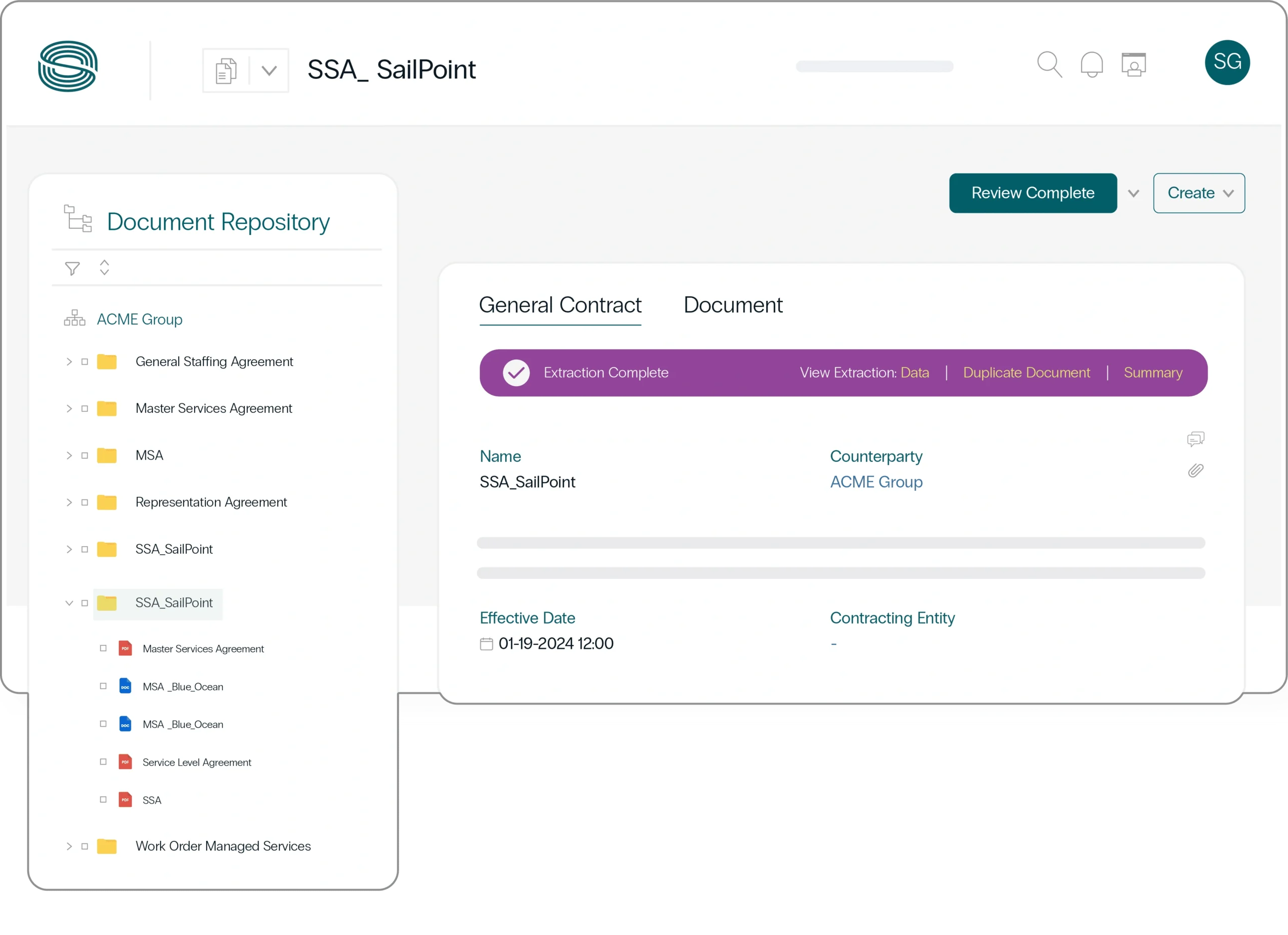
- Last Updated: Dec 26, 2025
- 15 min read
- Sirion
For many organizations, the days of file cabinets and spreadsheets for storing contracts are long gone. The transition to cloud storage systems has allowed businesses to centralize and secure their contract data in one place, ensuring easy access and preventing information breaches. But here’s the catch—just storing contracts in a cloud system is only the beginning. While it’s an important step, this is just one part of the broader contract management puzzle. To truly unlock the power of contract data, organizations need a contract repository system that does much more than just store documents.
From Simple Storage to Strategic Insights
Moving contracts to a cloud-based system may seem like a big leap forward from paper files. Centralizing documents ensures accessibility and scalability. But a cloud storage system alone is still just that—a repository. It holds contracts, but it won’t enable you to extract specific, actionable insights that can improve your contracting processes or inform future decisions.
A modern contract repository system, however, transforms this static storage function into something far more dynamic. It’s not just about housing documents but also about enabling organizations to pull critical data—like clauses, terms, and obligations—from hundreds of contracts quickly and easily. More than just a digital filing cabinet, it’s a tool for harnessing the strategic value hidden within your contracts.
Transforming Storage into Action: What a Contract Repository System Must Deliver
For a contract repository system to deliver more than just storage, it needs to be more than a place to “park” contracts. It should be a key enabler for smarter, faster, and more strategic decision-making across the organization. Here’s what a contract repository system must do:
- Turn Contracts into Business Intelligence: Contracts contain vital business data—whether in PDFs, handwritten notes, or price tables. A robust repository system turns these into interactive sources of insight, allowing teams to make informed decisions based on real-time data.
- Instant Access to Critical Information: A well-built contract repository system should let users instantly locate clauses, terms, or specific data points using intuitive, natural language queries. This is where semantic search becomes the true differentiator. Instead of relying on exact keyword matches, semantic search understands context—helping you find “termination rights” even if they’re written as “exit provisions” or “early-out terms” across different contracts. By eliminating manual hunts through endless files, semantic search ensures teams can act faster and with greater accuracy.
- Enhanced Security and Access Control: Contracts often involve sensitive information. A strong contract repository system should feature tight access controls, ensuring that only authorized users can access specific documents and protecting the organization from data breaches or unauthorized access.
- Seamless Integration with Enterprise Systems: A good repository system doesn’t work in isolation. It should integrate seamlessly with other enterprise tools, like CRM, ERP, and P2P systems, ensuring that contract data is automatically synchronized across all relevant platforms for smoother operations and compliance.
By delivering these outcomes, a contract repository system becomes far more than a storage solution—it’s a tool that empowers organizations to act on their contract data, reduce risks, and drive greater business efficiency.
How a Contract Repository Handles Enterprise-Scale Complexity
Large enterprises don’t just manage contracts—they manage interconnected networks of agreements spanning global suppliers, customers, subsidiaries, and regulators. At this scale, contract management is no longer about storage—it’s about making millions of documents searchable, analyzable, and actionable in real time.
Sirion’s contract repository is built for this level of complexity:
- Semantic Search at Global Scale: In M&A due diligence, every liability and obligation hidden across thousands of contracts can alter deal value. Sirion’s semantic search instantly surfaces relevant clauses—like change-of-control, indemnities, or early termination—regardless of how they’re worded in different contracts, jurisdictions, or languages.
- Compliance Across Jurisdictions: Regulations vary across regions, from GDPR in Europe to HIPAA in the U.S. Sirion makes compliance traceable by enabling enterprises to search and validate obligations across millions of agreements—flagging exposure in seconds instead of months of manual review.
- Multi-Entity Precision: Enterprises often manage multiple subsidiaries or business units, each with its own contract set. Sirion lets teams query across entities to consolidate supplier terms, benchmark risk positions, or align obligations globally.
- Risk and Performance Visibility Beyond Search: Results aren’t static lists—they connect to obligation tracking, spend analysis, and performance dashboards. Enterprises can see not only where risks exist, but also how they’re being managed across global portfolios.
- Enterprise-Grade Security and Auditability: At scale, sensitive contracts must remain protected while still accessible to the right people. Sirion ensures semantic search results respect role-based access, audit trails, and data sovereignty rules across jurisdictions.
The Result: Enterprises can handle the toughest contracting scenarios—whether preparing for an acquisition, navigating new regulatory mandates, or restructuring global operations—with confidence and speed. Semantic search at scale turns what was once weeks of manual work into minutes of actionable intelligence.
Navigating Changing Complex Business Scenarios with Confidence
Mergers, acquisitions, divestitures, and reorganizations often redefine the trajectory of large enterprises. These are high-stakes moments where contracts determine liabilities, risks, and opportunities. A modern contract repository system ensures that businesses don’t just centralize contracts but can actually act on them with speed and clarity.
- M&A Due Diligence: Instead of sifting through thousands of agreements, teams can instantly access critical clauses—such as change-of-control or early termination provisions—using Sirion’s AI-powered repository. This accelerates due diligence and reduces deal risk.
- Divestitures & Reorganizations: Contract obligations tied to divested entities or restructured units can be quickly identified and transitioned, minimizing disruption.
- Strategic Decision-Making: As enterprises grow, semantic insights into supplier performance, compliance gaps, or renegotiation opportunities provide leaders with the intelligence needed to adapt.
By centralizing contracts and providing actionable insights, a modern contract repository system gives enterprises the clarity and control needed to navigate complex business scenarios with confidence.
Sirion’s Contract Repository: Transforming Contracts into Strategic Assets
If you’re looking to not only centralize your contracts but also turn them into valuable business insights, Sirion’s contract repository system is designed to do just that. Sirion goes beyond simple storage by offering advanced features that make your contract data more accessible, actionable, and secure.
Contract Repository System Feature Highlights:
- Seamless Integration: Sirion integrates effortlessly with your enterprise’s legacy systems—such as ERP, P2P, and CRM—allowing you to ingest and manage every contract in a single, unified system.
- AI-Driven Insights: AI-driven insights for contracts enable you to identify and track key elements such as clauses, obligations, and pricing with Sirion’s industry-specific AI models, helping you extract critical data with ease.
- Real-Time Access and Visibility: Get full visibility into your contract portfolio, including parent-child relationships between contracts, and ensure you never miss a deadline or opportunity with role-based dashboards and AI reminders.
Key Outcomes:
- 80% Faster Contract Digitization: Streamline the process of organizing and digitizing contracts, making your contract data searchable and actionable.
- 90% Faster Semantic Searches across Millions of Contracts.: Quickly find answers to complex legal queries with plain-language search capabilities.
- 70% Less Time to Set Up a Structured Repository: Fast-track the organization of your contracts for better accessibility and insights.
Conclusion
In conclusion, a modern contract repository system is not just about storing documents; it’s about unlocking the full potential of your contract data. By transforming static storage into actionable insights, organizations can enhance decision-making, streamline operations, and effectively navigate complex business scenarios. With tools like Sirion’s contract repository, businesses are empowered to thrive amidst change, leveraging their contracts as strategic assets that drive success and sustainability. Investing in a robust contract repository system is essential for organizations aiming to enhance their operational efficiency and maintain a competitive edge in today’s dynamic marketplace.

Sirion is the world’s leading AI-native CLM platform, pioneering the application of Agentic AI to help enterprises transform the way they store, create, and manage contracts. The platform’s extraction, conversational search, and AI-enhanced negotiation capabilities have revolutionized contracting across enterprise teams – from legal and procurement to sales and finance.


